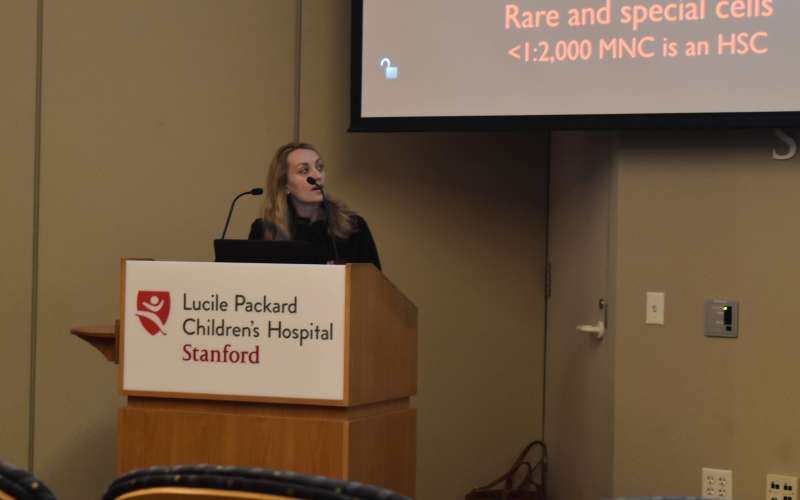One in 285 children in the United States will be diagnosed with cancer by age 20, according to the American Childhood Cancer Organization. But for kids born with Fanconi anemia, the risk is much higher — almost a certainty.
Many of these kids’ bone marrow will fail as a result of their disorder, meaning they need blood-forming, donor stem cell transplants to sustain health after their own blood and immune systems fail. Doctors currently wait for a patient’s own bone marrow to fail before offering such a live-saving stem cell transplant.
Stem cell transplants normally require therapies, such as radiation and chemotherapy, so the children’s failing stem cells can be replaced with healthy donor stem cells, but these toxic treatments often lead to prolonged hospitalizations, deadly infections, infertility and secondary cancers.
For kids with Fanconi anemia, who cannot repair DNA damage as a result of their genetic disease, the side effects can be worse, which ultimately limits the use of these treatments.
Agnieszka Czechowicz ’05 Ph.D. ’10 M.D. ’11, assistant professor in pediatrics, along with Associate Professor Sandeep Soni, members of the Center for Definitive and Curative Medicine and the Stanford Children Health’s stem cell treatment team are testing a preventive treatment that will genetically-modify the patients’ own stem cells to prevent bone marrow failure and hopefully blood cancers — potentially ending the need for radiation and chemotherapy post-failure. Once in the body, these corrected stem cells should give rise to new cells and serve as the body’s repair system.
Now, children with Fanconi anemia Type-A — one of several syndromes which lead to bone marrow failure — are being screened at Lucile Packard Children’s Hospital to potentially participate in a clinical trial sponsored by Rocket Pharmaceuticals for the gene therapy treatment. Stanford Medical Center is the only site in the U.S. offering the treatment at this time.
“The prospect of a single treatment in her area of study is really exciting,” said Harvey J. Cohen, pediatrics professor and former chair of Stanford’s pediatrics department. “She’s a leader in the field of gene therapy.”
Czechowicz, who was awarded the Harvey J. Cohen Endowed Lectureship in Pediatrics, presented her research at the first Pediatric Grand Rounds of 2019. She studies blood-forming stem cells in the Stem Cell Transplantation and Regenerative Medicine division of the Stanford School of Medicine’s Pediatrics department with a growing team of researchers.
For the last decade, Czechowicz along with Irv Weissman M.D. ’65, Judith Shizuru M.D. ’92 Ph.D. and colleagues have been pioneering alternative approaches to traditional stem cell transplants. They have been using proteins called antibodies, which target patient’s failing stem cells and identify and remove offenders. These treatments, called antibody-based conditioning, are primers for stem cell transplantation and may eliminate the need for the current chemotherapy or radiation pre-treatment.
A clinical trial led by Rajni Agarwal is already underway at Stanford Children’s testing the first-generation antibody-based conditioning in children with severe combined immunodeficiency. Czechowicz was awarded $180,000 by the Fanconi Anemia Research Fund last year to develop a similar treatment for Fanconi anemia. She is in the process of conducting other studies and planning an additional clinical trial which could dramatically decrease the toxicity of such transplants, further enabling their use as preventative therapies.
Optimally, these types of treatments could be offered even before the disease appears, Czechowicz said. They could potentially be performed with minimal side effects, meaning children would be able to receive them easily as outpatients.
Czechowicz and colleagues also recently reported in Nature Communications on next generation approaches in mice to potentially improve the safety and efficacy of these antibody-based stem cell treatments. They also found that the stem cell donors do not need to be perfect matches for the recipients, eliminating the need for an immune-match for transplantation.
“We hope to expand and apply this research to all types of blood and immune diseases: genetic, malignant and even autoimmune,” Czechowicz said. “This work has made nice progress since I started as a student, but there is much more to be done. Additional resources and community support are much appreciated in our efforts.”
Contact Gillian Brassil at gbrassil ‘at’ stanford.edu.
A previous version of this article conflated separate studies and treatments. The Daily regrets this error.
